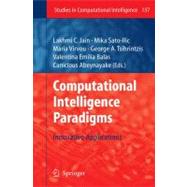
Computational Intelligence Paradigms
by Jain, Lakhmi C.; Sato-ilic, Mika; Virvou, Maria; Tsihrintzis, George A.; Balas, Valentina EmiliaRent Textbook
Rent Digital
New Textbook
We're Sorry
Sold Out
Used Textbook
We're Sorry
Sold Out
How Marketplace Works:
- This item is offered by an independent seller and not shipped from our warehouse
- Item details like edition and cover design may differ from our description; see seller's comments before ordering.
- Sellers much confirm and ship within two business days; otherwise, the order will be cancelled and refunded.
- Marketplace purchases cannot be returned to eCampus.com. Contact the seller directly for inquiries; if no response within two days, contact customer service.
- Additional shipping costs apply to Marketplace purchases. Review shipping costs at checkout.
Summary
Table of Contents
| An Introduction to Computational Intelligence Paradigms | p. 1 |
| A Quest for Adaptable and Interpretable Architectures of Computational Intelligence | p. 25 |
| MembershipMap: A Data Transformation for Knowledge Discovery Based on Granulation and Fuzzy Membership Aggregation | p. 51 |
| Advanced Developments and Applications of the Fuzzy ARTMAP Neural Network in Pattern Classification | p. 77 |
| Large Margin Methods for Structured Output Prediction | p. 109 |
| Ensemble MLP Classifier Design | p. 133 |
| Functional Principal Points and Functional Cluster Analysis | p. 149 |
| Clustering with Size Constraints | p. 167 |
| Cluster Validating Techniques in the Presence of Duplicates | p. 181 |
| Fuzzy Blocking Regression Models | p. 195 |
| Support Vector Machines and Features for Environment Perception in Mobile Robotics | p. 219 |
| Linkage Analysis in Genetic Algorithms | p. 251 |
| Author Index | p. 281 |
| Table of Contents provided by Blackwell. All Rights Reserved. |
An electronic version of this book is available through VitalSource.
This book is viewable on PC, Mac, iPhone, iPad, iPod Touch, and most smartphones.
By purchasing, you will be able to view this book online, as well as download it, for the chosen number of days.
Digital License
You are licensing a digital product for a set duration. Durations are set forth in the product description, with "Lifetime" typically meaning five (5) years of online access and permanent download to a supported device. All licenses are non-transferable.
More details can be found here.
A downloadable version of this book is available through the eCampus Reader or compatible Adobe readers.
Applications are available on iOS, Android, PC, Mac, and Windows Mobile platforms.
Please view the compatibility matrix prior to purchase.
